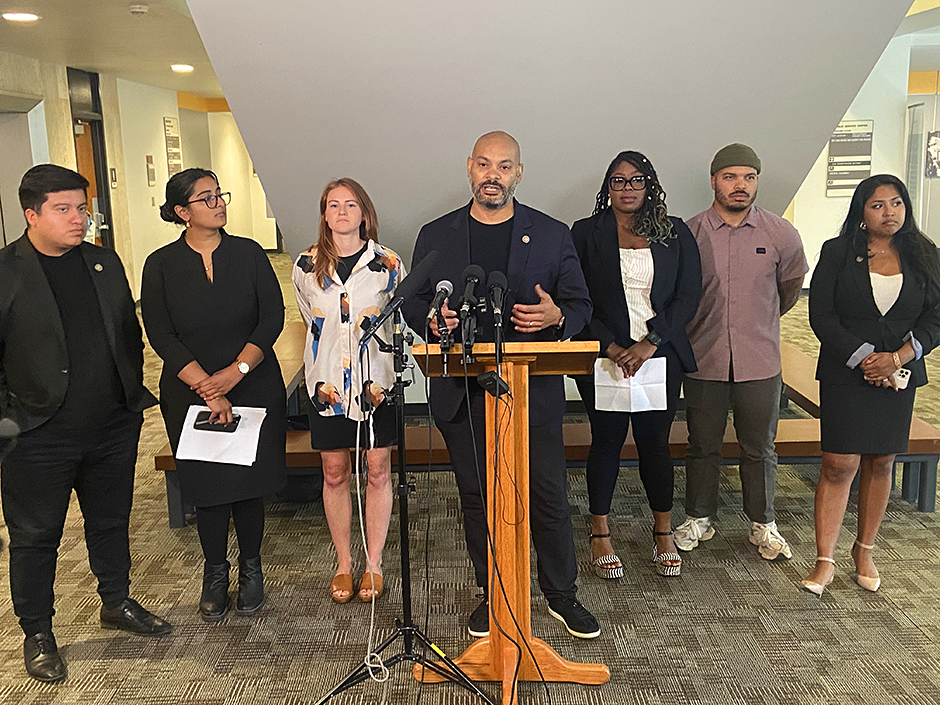The Minneapolis City Council voted 8-4 on Thursday to approve the latest Minneapolis Police union contract, as tension looms over how to fund it.
The agreement between the city of Minneapolis and the police union, known as the Minneapolis Police Federation, would give officers an historic 21.7% salary increase over three years. It would make Minneapolis police among the highest paid in the state – a point its proponents argue will help the department remedy staffing woes.
“Having the pay increases, having it be one of the best paid in the state is absolutely necessary to retain the outstanding men and women of this agency and to attract the very finest young men and young women who are looking to serve,” said MPD Chief Brian O’Hara at a Thursday news conference.
The new contract pushes starting salaries above $90,000 per year, and adds raises of 5.5% in July, 2.5% in January and another 3.5% next year, in addition to prorated back pay for current officers.
After voting on the contract, the council voted on another proposal that would use downtown asset funds and American Rescue Plan money that is set to expire to pay for the more than $9 million in future raises. During a news conference after the council meeting, Council Vice President Aisha Chughtai explained that the cost would be covered by local sales taxes generated by things like hotels and liquor.
Minneapolis Mayor Jacob Frey had originally called for using funds already allocated for comprehensive public safety and policing alternative programs to pay for the forthcoming raises. He also likened using downtown asset funds to a “shell game.” The more progressive members of the council decried that idea.
“I don’t understand what the mayor is insinuating, but to imply even in the slightest that this is a ‘shell game’ is very irresponsible,” Chughtai told reporters. “This is a lawful use of the money that (the) city has access to, and I can’t help it that he would rather gut comprehensive programs than use money that further supports over-investing in downtown.”
The process of negotiating the contract was also a first in that the public had much more input than with contracts in the past, including community engagement hearings held by the council and early bargaining meetings held in public. After more than six months of negotiations, the city and the union reached a tentative agreement early last month.
In addition to the raises, the new contract includes some policy changes, like giving the MPD chief more discretion over assigning officers different posts. It also stops officers from being automatically notified of the identity of someone who puts in a data request for their information, as well as allowing the hiring of civilians to do some clerical and investigative work within the department to free up officers for other duties.
Supporters of the contract say the changes will help make the department more flexible with its staffing as it remains hundreds of officers below its previous strength, and allow for more accountability. The council members who voted against it believe it doesn’t go far enough, calling the provisions in the contract “temporary gains for permanent raises.”
“I believe in historic pay raises but I believe that those historic pay increases should come with historic and permanent reforms,” said Ward 9 Council Member Jason Chavez, who voted no.
Ward 5 Council Member Jeremiah Ellison said during his years on the council, the union contract has been touted as a solution to whatever issue the city was having with the police department at the time, whether it be accountability or staffing woes. Ellison, who voted no, cautioned against relying on the contract to solve issues with the department that will require further work from the city.
“I do hope that the mayor and the chief are sincere in their efforts finding solutions for those other things, because again, I’d hate to be here in a couple of years (and)there’s some new issue with the department and we’re sitting here promising the contract will fix that,” Ellison said.

Mohamed Ibrahim
Mohamed Ibrahim is MinnPost’s environment and public safety reporter. He can be reached at mibrahim@minnpost.com.





